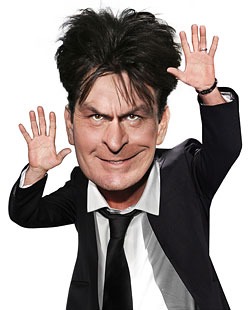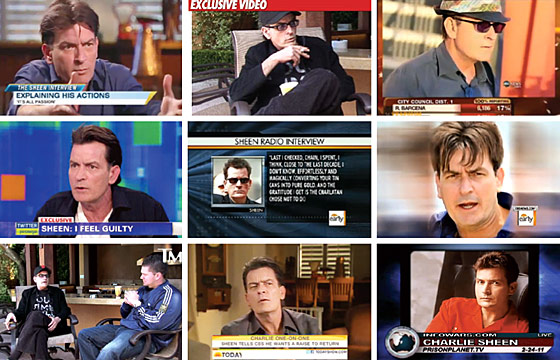
A couple of weeks and a thousand interviews ago, it looked as if Charlie Sheen, who has now told the world that the only thing he’s addicted to is “winning,†was actually going to win.
Not “win†as in “live happily ever afterâ€; for a guy who says he’s off drugs but boasts of his ability to ingest “seven-gram rocks†of crack cocaine, and who muses about how “chivalrous†he is while enjoying a three-way with a porn star and a model, “happily ever after†is likely to be brief, and subject to frequent and frantic revision. But in the early stages of his standoff with CBS and Warner Bros. Television, Sheen, for one intriguing moment, seemed to have the upper hand. Soon after his employers had put Two and a Half Men on its second hiatus in a year so that its star could deal, again, with his ongoing drug problem, Sheen decided to discard the abject-apology playbook that has become a showbiz staple. Instead, he made a very public case for an extreme new paradigm in the annals of celebrity-addiction culture: As long as I show up to do my job, which is to deliver my lines and hit my marks as the highest-paid actor per episode in the history of television, the rest of my life is none of your business. And for a while, a network and a studio seemed meekly willing to submit to the new rules of its most valuable player, no matter how outlandish, rather than lose him.
Then, of course, it all went south. No more waiting, no more dismissing every incident—the trashing of the Plaza Hotel suite and the terrorizing of an escort and the wasted weekends in Vegas and that Very Charlie Christmas when he was arrested for menacing his then-wife—as so much amusing rambunctiousness. CBS and Warner Bros. finally decided that making a huge display of respecting a star’s privacy while using him to make a lot of money was no longer sustainable. The move to shut down a $1 billion-plus money machine represented a long-Âoverdue admission that you can’t ultimately separate the personal from the professional when the personal becomes so baroquely public. And as one insider said, “Charlie’s behavior made a very hard decision into a much easier one.†Instead of changing the paradigm, Sheen ended up sparking the wrong kind of national conversation: When you become aware that the person you’re watching spout off may be suffering from mental illness, is it still okay to, you know, really not like him? Or, worse, laugh at him?
Giant entertainment conglomerates have it tough these days when it comes to dealing with misfit toys like Sheen. They’re like the government: Liberals want them to provide the safety net of firm but gentle intervention; libertarians want them to leave everybody alone; and conservatives just want them to maintain what the late Molly Ivins used to call a “healthy bidness climate.†For a while, Sheen seemed to intuit that his bosses were, as he might put it, addicted to losing. If they kept the show going and he dropped dead on the set, they’d be accused of indifference to his condition. If they forced him into rehab, they’d be seen as embracing a nanny-state mentality that would put people out of work and destroy one of their biggest hits. And Sheen knew how to play to two different constituencies—his show’s loyal audience, and that segment of the male populace that imagines that endless house-call deliveries of coke and sex constitute “living the dream,†guys who think that Sheen is badÂass! Never mind that when the actor, at 45, uses phrases like “check it!,†“my crew,†and “getting up in my grill!,†he sounds about as gangsta as Modern Family’s Phil Dunphy. Didn’t matter: Sheen has always been a big success at playing, on the air and off, a sitcom version of himself, complete with a long-standing TV-style nickname that nods to his epic stamina: the Machine.
But the idea that Sheen is Mr. Fun, that his crimes are just “antics†and that his defiance makes him an exemplar of “I gotta be me†frankness, has always been predicated on underexposure. Until recently, people could watch the bad-boy behavior of his more palatable alter ego Charlie Harper on Two and a Half Men, and then read about his various crack-ups and court dates, appreciating him from afar as a kind of one-man, web-based tabloid theme park. But then the Machine miscalculated; he started talking and never stopped, venting his inflamed sense of entitlement to every radio show, Internet site, and camera crew that was willing to serve as enabler, gawker, exploiter, concern troll, or cheering section, from TMZ to daily updates on the Today show. And with every insistent interview, it became clearer that Hollywood’s Last Honest Man was merely a rageful wreck with a bottomless need for attention. Suddenly, everybody remembered several things they should never have forgotten in the first place, among them that a “functioning addict†who imagines himself to be a folk hero and truth teller is usually one imminent dumb move away from Âbeing a case study in self-Âimmolation, that two powerful corporations always have the ability to say no, even to a moneyÂmaker, and that while cocaine, porn stars, arrests, and rumored overdoses can all be forgiven, you still don’t get to call your boss a “clown,†an “AA Nazi,†and a “charlatan†in public, then Jew-bait him. Those rules apply even if you are, as Sheen has announced, a “rock star from Mars†with “tiger blood and Adonis DNA.â€

And with that, the Dorian Gray–ish chasm between Sheen’s onscreen persona (charming womanizer who always gets the last word) and his offscreen self (charmless bimbo magnet who never shuts up) became too wide to bridge. Last week’s downward spiral of “exclusives,†in which the actor, overflowing with the bewildered arrogance of a deposed king, announced that he had instantly cured himself of everything and was ready for vengeance, was a hair-raising demonstration of the Cokehead Curse: Being hyperarticulate while having nothing worth saying. Sheen himself suggested, in what sounded perilously close to psychosis, that his mind “fires in a way that is maybe not from this particular terrestrial realm.†That’s unlikely to play well with Two and a Half Men’s core audience (typical residence: Earth). The grandiose rants, the preening narcissism, the jabbery infomercial-style intensity painted such an ugly picture that his insistence that we were all seeing the new, clean Charlie Sheen felt self-defeating. If he’d been high, at least we could have said, “It’s the disease talking.†And perhaps it still is. But the haggard, seething guy under the disease doesn’t seem like someone you want to invite into your home once a week. Or ever.
Of course, he’s got money on his mind. The fantasy about HBO offering him $5 million a week, his delusion that bidding will start at $10 million for the tell-all book he’s pretending he’ll write, his spectacularly tone-deaf assertion that at nearly $2 million per episode, he is “underpaid,†his insistence that CBS apologize “while licking my feet†in the same breath as his offer to return for two more seasons—it’s all nuts (albeit a degree of nuts not even Hollywood has seen before). But it does reveal that Sheen still has one tiny toehold in financial reality: Barring a miracle, “That Darn Priest,†the February 14 episode of Two and a Half Men, may mark the last time he will ever see a seven-figure paycheck for four days of work. Revenge, for Sheen, means cash—the only measure other than Twitter followers and notches on the bedpost by which he can be sure that he’s “duh—winning!†(When your newly minted philosophy of life becomes a national punch line and Internet meme overnight, something has gone wrong.)
Anyway, he’s threatened to sue. There remain questions about whether his Two and a Half Men contract contains what’s known as a “morality clause,†allowing his bosses to fire him for bad behavior. If Sheen is asked about that on the witness stand, he’ll have to do better than his recent response, which was “Yeah, blah blah, nitpick, nitpick, I mean, I haven’t read it.†Meanwhile, Warner Bros. TV has bought itself a couple of months to weigh its options, which are: effecting a reconciliation (stranger things have happened), squeezing another season or two out of the show by soldiering on with or without a new character (also possible), or saying that 177 episodes is enough.
Recently, Sheen has said he relates to Marlon Brando’s character in Apocalypse Now, intoning his line, “You have the right to kill me, but you do not have the right to judge me.†He isn’t wrong when he says his life feels like a movie—though it’s not the one he’s thinking of. If anything, his former employers have just played out the final act of Network—specifically, the moment when the corporation realizes that it has gotten everything it’s going to get out of its completely bonkers golden goose and doesn’t need him anymore.
But it was a different film that came to my mind when Sheen announced sneeringly in a February 24 interview, “News flash: I am special and I will never be one of you!†Who, exactly, did he mean by “youâ€? People who have to live every day “with their ugly wives in front of their ugly children and just look at their loser lives and then they look at me and say, ‘I can’t process it.’ Well, no, and you never will! Stop trying! Just sit back and enjoy the show.â€
Listening to Sheen rap out that suicide note of a monologue just hours before they pulled the plug on his series reminded me of Elia Kazan’s great 1957 movie A Face in the Crowd. In it, Andy Griffith plays Lonesome Rhodes, a misanthropic creep who becomes a successful populist entertainer and quickly acquires a dangerously demagogic sense of his own importance and invulnerability. (“Lonesome Rhodes is the people! The people is Lonesome Rhodes!â€) In the end, he destroys himself by saying, on air, “Those morons out there? … I can make ’em eat dog food and think it’s steak … You know what the public’s like, a cage full of guinea pigs. Good night, you stupid idiots!â€
Good night, Charlie.